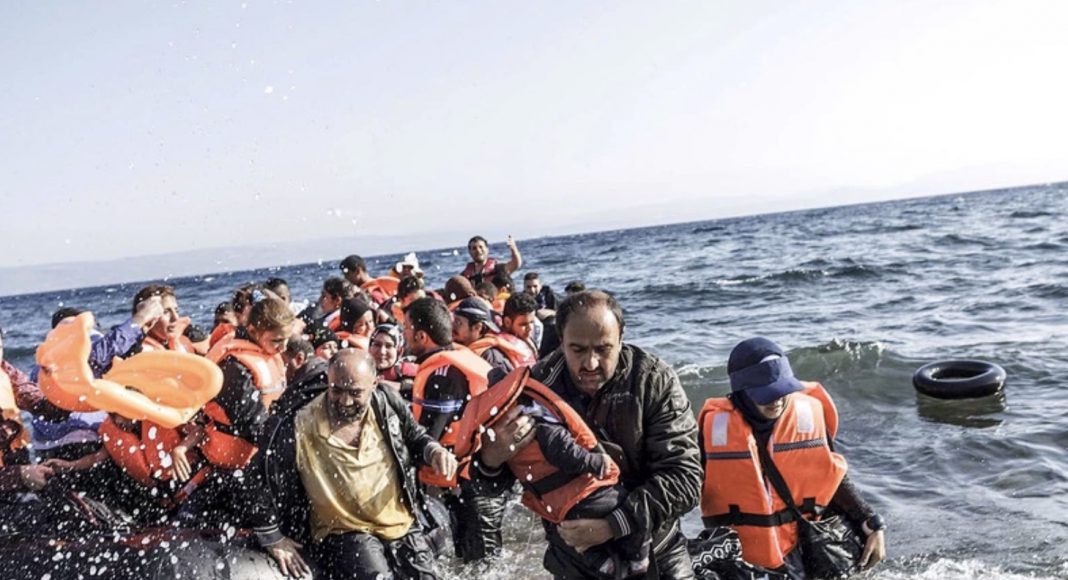Almost four years after its launch with great fanfare, the EU’s so-called ‘hotspots’ in Greece have morphed into its worst fundamental rights issue.
The head of the EU’s Fundamental Rights Agency, Michael O’Flaherty, told MEPs on Wednesday (6 November) that the plight of trapped migrants on the islands “is the single most worrying fundamental rights issue that we are confronting anywhere in the European Union.”
His comment, qualified as personal, follow a complete breakdown of the EU and Greek efforts to help some 14,000 people stuck at the Moria camp in Lesbos island, designed to house just 3,000.
The hotspot, a term coined by the EU to obfuscate the mention of camps given Europe’s Nazi past, was meant to rapidly and humanely deal with people arriving from Turkey seeking international protection.
But in reality, people (of which around half are children) are forced to live in conditions so bad that some have tried to kill themselves given the misery, traumas, and utter lack of hope.
“Some [suicide attempts] were younger than 10 years old,” said Inma Vazquez from NGO Doctors Without Borders, noting that around a quarter of their child mental health patients in Lesbos also commit self-harm.
Some of those stuck on the islands have been there for well over a year. In Lesbos, there is a toilet for every 200 people. In Samos, another Greek island, it is one for every 300.
Teenagers are now reportedly turning to prostitution to make ends meet as many are forced to live under tarpaulin sheets, sleep out in the open, and struggle to fight away hunger.
Many of these conditions have persisted for years amid repeated promises by the European Commission and the Greek authorities that everything is being done to improve the conditions.
The commission has since offloaded the blame onto the Greek government, while Athens attacks other EU states for not doing more to help.
Both appear increasingly trapped by the EU-Turkey deal – with an assertive Ankara using it as leverage against an EU that is bent on preventing any repeat of the one million plus migrant arrivals in 2015.
That deal included the EU spending €6bn to help some 3.6 million refugees in Turkey, funds which are mostly shuffled through big NGOs like the United Nations Refugee Agency (UNHCR).
The plan was also supposed to send back rejected arrivals from the Greek islands but backfired given Turkey’s patchy application of the 1951 Refugee Convention and Greece’s slow asylum process and appeals system.
At the time, the European Commission had also given its legal okay on the non-binding pact, amid claims Turkey would extend protection rights to all non-Syrians such as Afghans and Iraqis.
Turkey’s recent invasion into north-east Syria has since displaced some 130,000 people but the vast majority currently heading to the Greek islands are from Iran, Afghanistan and Pakistan.
Close to 54,000 people have reached the islands from Turkey since the start of 2019, compared to just over 42,000 last year.
The new centre-right Greek government now says it is doing everything possible to ease the overcrowding on the islands, which totals some 35,000, but is unable to manage despite receiving €2bn of EU funds in aid.
“We can’t manage so many people when they arrive at the same time. We cannot do it. We can’t help everyone, we can’t guarantee everything all the time. We are not providing enough protection,” said Michalis Chrisochoidis, Greece’s minister for citizens’ protection.
Part of Chrisochoidis response to the overcrowding, however, has only sharpened further criticism from human rights groups.
The Greek government recently passed a new asylum law it says aims to ease a backlog of 68,000 asylum demands and speed-up new requests.
But some of those provisions are controversial and described by Human Rights Watch as an effort to lock access to protection and increase deportations.
Chrisochoidis also appealed for EU states to help take in some 4,000 unaccompanied minors – but was then broadly ignored.
“I have asked for each country to take in voluntarily a small number of these unaccompanied minors. Unfortunately, I received only one response to that letter,” he said.
Sourced from EU Observer.

